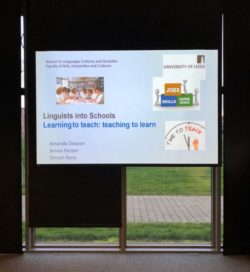Learning to Teach: Teaching to Learn
By Simran Rana and Jenica Harper (LCS Students)
This year, we started semester two not at the University of Leeds, but at Maynooth University in Ireland! We had the pleasure of attending and co-conferencing with teaching fellow Amanda Deacon at the Association of University Language Communities (AULC) Conference 2020.
 The AULC has over 60 higher education institution members in the UK and Ireland, and aims to unite language teaching and learning professionals. The event was a great chance to share the excellent work carried out by current and past students, as well as module leaders, in the development of the Linguists Into Schools module offered to second and final year languages students at the University of Leeds.
The AULC has over 60 higher education institution members in the UK and Ireland, and aims to unite language teaching and learning professionals. The event was a great chance to share the excellent work carried out by current and past students, as well as module leaders, in the development of the Linguists Into Schools module offered to second and final year languages students at the University of Leeds.
Here are some reflections on our conference experience!
Simran Rana
As a final year BA Spanish student currently undertaking the Linguists Into Schools module, my role in the presentation ‘Learning to teach: teaching to learn’ involved putting the audience into my shoes, sharing my recent experiences as a languages assistant at a secondary school in the outskirts of Leeds. I discussed topics such as the ups and downs of the module, my own learning while teaching, an insight to varying language learning practices in the classroom and how this module contributes to my employability, given that my current career plans do not involve the education sector. Having the opportunity to co-present at the conference has definitely boosted my personal and professional development. It has greatly helped with my confidence, learning how to articulate effectively and clearly, whilst engaging the audience as I present. I am pleased to say these skills have been put to good use in recent assessed presentations in two of my Spanish modules, including Linguists Into Schools.
The great part about the event was not only being able to share the progress made at the University of Leeds, but also to hear about the innovative practices at other universities. One presentation that I especially enjoyed was by Kristina Notthoff, German language teacher at the University of Nottingham. Notthoff opened my eyes to the use of authentic board games in the language classroom, and how they can be a useful tool in the development of speaking skills. This inspired me to research further and base my own presentation, for the Linguists Into Schools assessment, on the use of innovative activities in the classroom. This centred around the aim of creating a fun, interactive, comfortable and stress-free environment, as a way to facilitate and promote student target language use through oral expression. To sum up, I have truly enjoyed being part of this intense yet informative conference, alongside having the opportunity to showcase the great work behind the Linguists Into Schools module!
Jenica Harper
Besides feeling super professional and getting a trip to Dublin, attending a conference is actually much more fun than it sounds! I arrived in time to explore the capital a little and settle into the (Harry Potter) accommodation before the start of the conference the following day. As we were presenting on the second day of the conference, I could spend the first seeing how they work – I’d never been to one before – and even picked up a couple presenting tips. We also hadn’t yet had a chance to practise, so we made use of the breaks to do so. Not that it’s all about food, but you may be happy to hear that pastries, fruit and coffee were, as is most often the case at conferences, continuously on offer. The conference lunch was a bit lack lustre, but we made up for this with a delicious dinner in Maynooth town centre. This was not only an opportunity to relax and consolidate our plan for the presentation, but also served as a reminder of the tutor-student relationship that we had formed as a result of working together on this project. I felt we were a unit from the University.
Like Simran, I really enjoyed hearing what other universities were getting up to in this field. One of the main areas that I found most interesting, and initially quite strange, was ‘Learning and Assessment in Education’. It was novel to hear about the desires of students in this area from the perspective of tutors, but hearing how they try to meet these expectations by devising new practices in response to student feedback, taught me to be more appreciative of the work that happens on the other side of marking criteria and feedback sheets. I found it inspiring to hear from experts in their field, and was particularly interested in what the Language Commissioner for Ireland, Rónán Ó Domhnaill, had to say on the struggle for the survival of Irish in the Republic of Ireland today. It made me reflect on the importance of the link between language and culture, and how by losing one we may forget the other.
